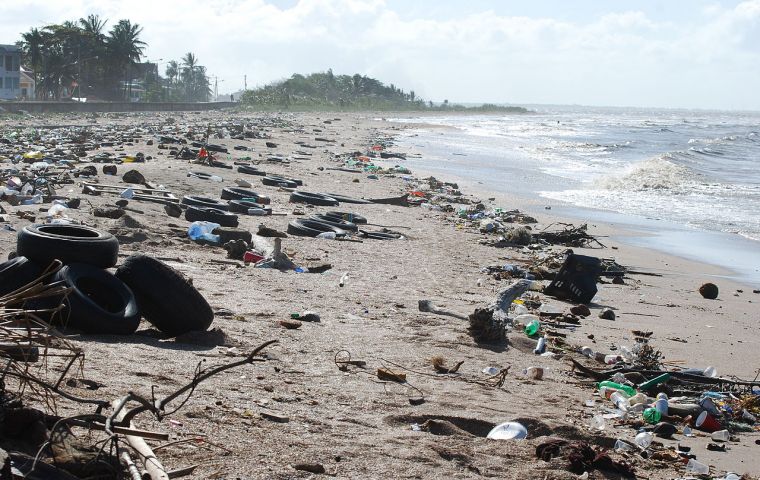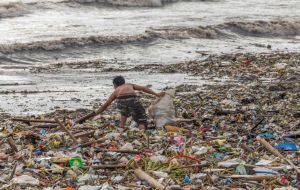MercoPress. South Atlantic News Agency
Plastic crisis: divert foreign aid to dumpsites in developing countries
 Some 38 out of 50 of the world’s largest uncontrolled dump sites are in coastal areas and many of them spill waste directly into the sea.
Some 38 out of 50 of the world’s largest uncontrolled dump sites are in coastal areas and many of them spill waste directly into the sea.  WestAid report shows that 2 billion people live without waste collection and 3 billion without controlled waste disposal – so the numbers affected can be huge
WestAid report shows that 2 billion people live without waste collection and 3 billion without controlled waste disposal – so the numbers affected can be huge By Christine Cole (*) - Plastic pollution in the oceans is a major problem that is finally getting the attention it deserves, thanks to Blue Plan II. It makes headline news almost every week – and famous figures such as the Pope, Prince Charles, Dame Ellen MacArthur and Sir David Attenborough have all joined the debate.
Regular people without such platforms can at least urge governments across the globe to take action. And one idea would be to use the budget for foreign aid.
While many countries still have a problem with litter, there are at least regular collections of waste and recyclable materials. The point is not that richer nations don’t need to address their use of plastic – they do – but that the benefits “per dollar” are much greater in poorer countries where even minimal interventions would make a huge difference. Therefore there is now a moral and environmental case for using aid money to support better waste management in poorer countries.
A recent report by the Chartered Institute of Waste Managers and the UK-based NGO WasteAid claims that mismanaged waste from developing countries accounts for up to 70% of ocean plastic by weight. Just five countries in East Asia are responsible for most of this. Meanwhile 38 out of 50 of the world’s largest uncontrolled dump sites are in coastal areas and many of them spill waste directly into the sea.
So to clear up marine plastics, we firstly have to address waste management in poorer countries. Doing so could halve the quantity of plastics entering the oceans worldwide.
But plastic doesn’t just affect the oceans, it also pollutes the air and water on land – and it directly harms humans too. Poor waste management is linked to diseases or conditions such as diarrhea, cholera, respiratory illness, and eye and skin infections.
The same WestAid report shows that 2 billion people live without waste collection and 3 billion without controlled waste disposal – so the numbers affected can be huge: roughly 9 million die each year of diseases linked to either mismanagement of waste or pollutants.
There’s even a climate change aspect to this, as waste that isn’t recycled or properly managed tends to be burnt off, releasing soot and other greenhouse gases into the atmosphere. If the growing volume of waste in emerging economies is not properly controlled, dumpsites could account for 8/10% of global greenhouse gas emission by 2015 at a time when international agreements are already attempting to control emissions.
Helping poorer countries deal with ever-increasing amounts of plastic and other waste is ultimately a core development issue – and one squarely within the remit of government ministries such as the UK’s Department for International Development (DFID) or international organizations such as the World Bank. It is much better to deal with plastic at the point it becomes waste, rather than attempt to salvage it later from the ocean. Treatment of waste is specifically mentioned in three of the UN’s 17 Sustainable Development Goals, after all. And waste also has an impact on many other UN goals, such as reducing poverty, improving health and equality, providing clean energy, cleaner cities and healthier populations and – last but not least – the protection of air, land and water from pollution damage.
As a member of the United Nations, the UK has committed to spending 0.7% of gross national income on foreign aid, amounting to around £14 billion each year. Just 0.3% of this is currently spent on waste management. Diverting additional money would help out some of the world’s poorest communities – and help the people there to live healthier and happier lives. And it could also take a major step towards cleaning up the environment and tackling the ocean plastics crisis.
(*) Research Fellow, Architecture, Design and the Built Environment, Nottingham Trent University




Top Comments
Disclaimer & comment rules-

-

-

Read all commentsWhat a load of cobblers. The vaaaaast majority of us dispose of rubbish in dustbins. We dont drive down to the sea each week and tip rubbish in. Most of the detritis on our shores comes from ships dumping rubbish overboard after dark and damaged fishing gear. River dwellers in Africa and Asia and Island dwellers in the Pacific are major culprits. Why subsidise them?
Apr 10th, 2018 - 01:01 pm 0“River dwellers in Africa and Asia and Island dwellers in the Pacific are major culprits.”
Apr 10th, 2018 - 02:26 pm 0That was exactly the point of the article. Much of the waste comes from poorer countries without rubbish collections, so that is the best place to spend the money, rather than here where most people put it in dustbins and the rubbish is recycled or buried.
Pffftt… yeah spending it on recycling is bound to be number one priority in the third world…. Not!
Apr 10th, 2018 - 09:37 pm 0Commenting for this story is now closed.
If you have a Facebook account, become a fan and comment on our Facebook Page!